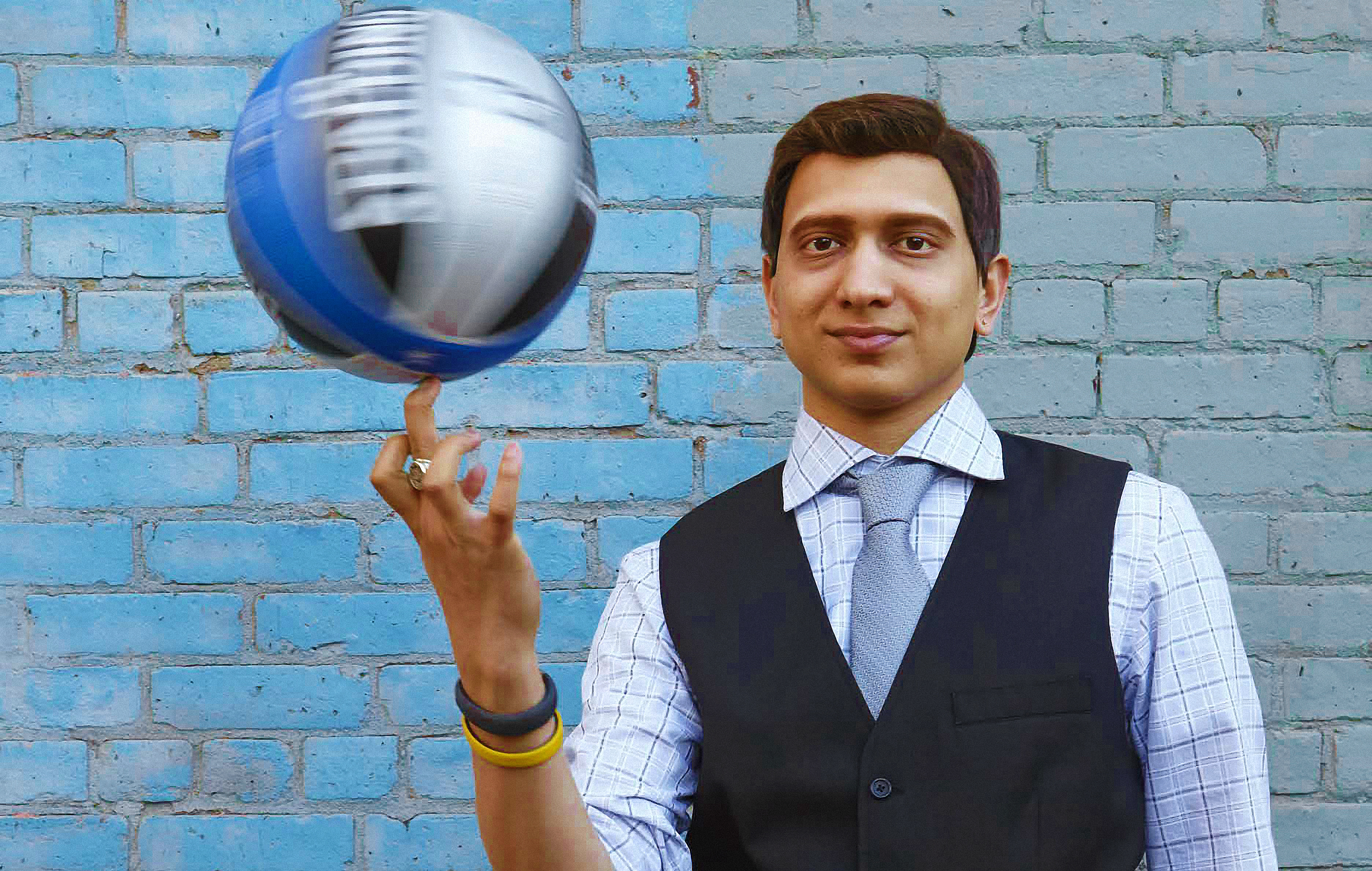Immigrant Entrepreneur: Vasu Kulkarni | Country of Origin: India | Emigrated to US: 2004 | Founded Krossover: 2008 | Annual Revenue: $5 million | Jobs Created: 20 full time, 800 part time
Combining a love of basketball and a knowledge of technology, Vasu Kulkarni is transforming the lives of coaches and their players with his innovative company – Krossover.
 Vasu Kulkarni was born in California — making him unique among immigrant entrepreneurs — but when he was nine, his parents moved the family back to Bangalore, where Vasu lived until college at the University of Pennsylvania. During his youth in India, Vasu was immersed in his native culture, but he never let go of his American dream — to play basketball like his NBA heroes. Vasu never made it to the NBA, but using lessons learned in both India and America, he built a multi-million dollar business providing sports analytics, and now has a client roster of more than 1,000 teams, with many more knocking at his door.
Vasu Kulkarni was born in California — making him unique among immigrant entrepreneurs — but when he was nine, his parents moved the family back to Bangalore, where Vasu lived until college at the University of Pennsylvania. During his youth in India, Vasu was immersed in his native culture, but he never let go of his American dream — to play basketball like his NBA heroes. Vasu never made it to the NBA, but using lessons learned in both India and America, he built a multi-million dollar business providing sports analytics, and now has a client roster of more than 1,000 teams, with many more knocking at his door.
Born in America, Nurtured in India
When he was nine, his family returned to India, and Vasu Kulkarni was devastated. He loved American culture, but soon McDonald’s and Pizza Hut were a distant memory. However, he clung fiercely to his biggest passion — American basketball — even though it meant playing on muddy courts with homemade wire hoops. A decade later, when he returned to America for college his chance at athletic glory had arrived.
If Kulkarni wanted a career in sports, he’d have to create his own job.
But a 5’9” 130 lb. Indian kid like Vasu was too slight for NCAA basketball. Game over? Hardly. Vasu worked out every day to get bigger, stronger and faster. When he was a senior at Penn, he played Junior Varsity basketball and was affectionately nicknamed the “Bangalore Blitz” by his teammates. It was, he recalls, “the best time of my life.”
After graduation, he fired off letters and emails to every NBA team and equipment company, looking for a job in basketball, but no one even replied. Once again, it seemed the 5’ 9” Indian kid didn’t have the right resume. If he wanted a career in sports, he’d have to create his own job.
The Big Idea
Fortunately, Kulkarni was a keen observer, not only watching developments on the basketball court, but what was happening on the sidelines. He noticed, for instance, that the team’s statistician charted the action in every game — every shot, by every player, in every situation — with nothing but pencil and paper. He also knew that the coaches spent long hours viewing game film after every game, looking for player tendencies and mistakes, when they could have been home with their families.
“Talk about your idea to as many people as possible and eventually you’ll talk to the right guy.”
There was plenty of sports software for coaches on the market, of course, but nothing that would actually save them time and effort. The existing products just provided a framework; coaches still had to do all the hard work. Kulkarni figured that if he created a service-oriented product — one that would actually save time for coaches — he’d have no competition. He’d identified a need, and come up with a product idea; now all he had to do was build it!
His idea was to use software and Internet technology to provide a cost-effective service for coaches, breaking down game film for them and using filters that charted all possible situations and player combinations.
It was a brilliant idea, to be sure, but where to begin?
Taking Advantage of Networks: Here and Back Home
Although Kulkarni had no family money or personal assets, he did have something of value: networks in both America and back home In India, both of which would play a big role in the development of his business.
1. First he used the alumni network from the University of Pennsylvania, calling everyone he knew, and pitching the idea of using data analysis to enhance performance in team sports. Since he was still an undergraduate, he found it easy to get introductions to alumni and interested students.
The key to success, says Kulkarni, is to make sure that you’re not more than two degrees of separation from anyone you need. “If you talk about your idea to as many people as possible, eventually you’ll talk to the right guy.”
Ultimately this approach resulted in a $50,000 loan from a Penn grad student. With this infusion of cash, Kulkarni started development, working out of his apartment.
2. Next he tapped into his networks back in India, hiring developers for 70 to 80 percent less than American talent to produce his first prototype.
3. The third network he used was his basketball connections to test the viability of his new product, which he had named Krossover. He showed it to the coaches at Penn as well high school coaches in the area. They responded enthusiastically, typically saying, “This is unbelievable; you can’t really do this stuff, can you?” More importantly, they said that they would buy it if he could deliver.
A recommendation from a college intern and a quick overseas call netted Kulkarni $300,000 — enough to take development to the next level
Angel Funding
The original $50,000 investment disappeared quickly, so without his connections in India, Kulkarni might not have made it. Even so, with no cash coming in for more than six months, Kulkarni had to take on free-lance marketing and consulting work just to pay the developers. But there was a limit to how much he could bootstrap development: he needed a meaningful infusion of cash to take Krossover to the next level.
“If you talk about your idea to as many people as possible, eventually you’ll talk to the right guy.”
Given the appetite for sports in the United States, the potential market for Krossover was huge, yet it still wasn’t big enough to intrigue venture capitalists, who prefer investments capable of returning at least a billion dollars. However, Kulkarni needed much more than could be gotten through friends, family, and credit cards. That’s where angel investors came in. Kulkarni’s first angels came from halfway around the world, and they came from an unlikely source, an office intern who just happened to know people in Singapore looking for an investment — another instance of Kulkarni’s two degrees of separation theory.
To seal the deal with the angel investors, Kulkarni pitched them an encapsulated business plan over the phone. He stressed four critical points:
* His product idea
* Revenue strategy
* Size of the American sports market
* Testimonials – feedback from coaches, his potential customers
In the end, a recommendation from a college intern and a quick overseas call netted Kulkarni $300,000 — enough to take development to the next level.
Going to Market
In 2010, Kulkarni hit the road with an beta version of his new product, traveling to a coaching clinic in Las Vegas with 2000 coaches in attendance. He got a lot of casual browsers at his table, but no real interest except for a lone coach from Massachusetts whose team had not won a game in more than two years. A week later he sent them a check for $900 and Kulkarni had his first client, and, as it happened, a partner in product development. Using the coach as a sounding board, they built the first commercial version of Krossover.
What happened next sounds like a Hollywood movie: the winless coach took his team to the state championships the next season, helping to put Krossover and Kulkarni on the map. Sports is a word-of-mouth industry, coaches talk to other coaches, so that first client led to a bunch more clients in short order, and in the space of just two years Krossover went from 50 to 500 to 1,000 clients.
Growing Into the Future
Today, Krossover continues to grow rapidly. A multi-million dollar business based in New York City, Krossover has employees all over the country and in India too. Although, they still get plenty of word-of-mouth business, they have built a telemarketing team which canvasses the thousands of potential customers across the United States. To further fuel their growth, the company is expanding to cover not only basketball, but football, lacrosse and hockey too. They expect to add other sports such as soccer and baseball at the rate of one new sport per year.
Krossover is creating new kinds of products and services to expand their reach into the marketplace. They’re attempting to monetize the nostalgia market by offering to package highlight reels for individual players so that they’ll have an enduring memory of their glory years on the court or playing field in later years. And they’re selling packages to summer camps, informal adult pastimes , such as corporate softball and basketball leagues.
Their most exciting new product is called “siQ” a video based game for computers and tablets which scores individual players on their sports acumen using clips from real games. Still in beta, Krossover siQ is drawing attention not only from individual sports fans, but college and pro teams who want to use it as a means of evaluation during their recruitment of new players. Krossover siQ will be the company’s new growth engine in 2013.

